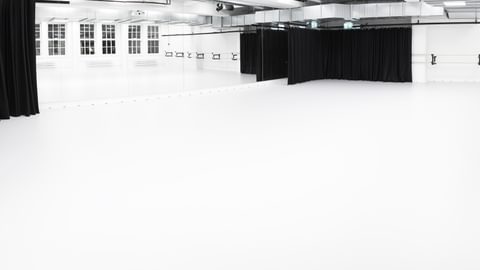
Interview with Jan Martens
Interview with Jan Martens
ArticleBelgian choreographer Jan Martens arrives at Dance House Helsinki this autumn. The dance performance Any attempt will end in crushed bodies and shattered bones captures the nature of rebellion and protest.

After ten years in the profession, choreographer Jan Martens is ready for the main stage. In his latest creation, any attempt will end in crushed bodies and shattered bones, no fewer than 17 dancers are on stage, as usual a colourful mix in terms of age, colour and gender. The youngest is 15 and is still studying at the Antwerp Kunsthumaniora. The oldest, Dutchwoman Truus Bronkhorst (68), has been around since the Swinging Sixties (although this iconic dancer was more of a punk than a swinger!). A delegation from the Berlin Dance On Ensemble, which brings together experienced performers over the age of 40, is also present.
"Like Pina Bausch, I like to build up a family during the creative process", says Martens from Sweden where he is currently rehearsing. "Hopefully you’ll see that in the show. The group is extremely heterogeneous. Some have a background in mime or performance, while the dancers of Dance On are technically very strong. It’s a matter of finding a way to bring out everyone’s unique value." Fortunately, that is something right up Martens’ alley, as the moving shows he has made in the past with amateurs (The Common People) and children (Victor) demonstrate.
Rebellion
For Any attempt will end in crushed bodies and shattered bones, Martens was inspired by the global wave of protests, from the Black Lives Matter marches (*BLM added after the interview, which took place in February 2020), the gilets jaunes to the young climate activists and the women’s marches in the US and Chile. How do you swim against the current? Or, applied to dance: how can standing still be a form of resistance or rebellion?
"Passing the Bechdel Test, a performance about feminism that I made last season with 13 young people at fABULEUS, changed me fundamentally. I now dare to be more explicit politically", says Martens. "We have little reason to be happy today. Radical right-wing thinking is creeping up everywhere, just like in the 1930s. With Brexit, a profoundly nationalist discourse has become mainstream again. In Flanders we have a government that is drastically cutting back on culture and welfare, and in Hungary Viktor Orbán is taking control of the city theatres. Have we seen the worst of it or is this just a prelude? Should we panic or wait? That’s a question that’s on my mind."
For the title of his new piece, Martens used a threatening quote from President Xi Jinping of China addressed to the demonstrators who have been occupying the streets of Hong Kong for months to demand more independence. "It’s interesting how Xi Jinping’s words were translated differently on different websites", says Martens. "In these post-truth times, language is no longer a tool with which we report facts, but an ideological weapon. Look at Trump! The most political act, as activist Rosa Luxemburg once said, is to name what is going wrong in society. How can we still do that today when language is no longer our ally? Therefore, as in Passing the Bechdel Test and Rule of Three, text will again play an important role."
Of course there’s also dance, lots of dance. "For the movement material we draw on different themes", says Martens. "For instance, we play with physical boundaries. How do you indicate that something is enough? In addition, we are also conducting research into folk dances. What interests me is that they not only create a connection between people, but also try to define a national identity, often using gender-stereotypical movements and costumes. How do you resist such physical oppression?"
Protest songs
Despite the sombre title, Martens also raises the question of hope. "The young climate activists are often dismissed as naive, but what if hope is the only engine to do something? Here too it’s interesting to bring different ages together on stage: we can expect young people to believe in a better world, but what about Truus Bronkhorst, who has seen history repeat itself over and over again? How does she see the future?"
For the music, Martens is collecting protest songs from different times, from Max Roach and Lauryn Hill to Górecki's Concerto for Harpsichord & String Orchestra. "I’m currently trying to determine what my parameters are for labelling a song a protest song. I’m researching music that reflects the generations on stage, but I’m also going further back in time: for example, who were the musical rebels of the sixteenth century?"
Bells and whistles
Conducting rehearsals with 17 dancers and 4 understudies is the biggest challenge Martens ever faced. "I’ve never been better prepared than for any attempt. Imagine also how much input I have to process after an improvisation exercise with 21 people! (laughs)."
After deSingel, Any attempt will travel to Julidans in Amsterdam and Sadler’s Wells in London. Not bad for a choreographer who will soon only turn 36. "For a long time I didn’t find it important to demand a place on the main stage with my work, but now, after ten years of making performances, the right moment has come. When it comes to big dance pieces, people often have certain expectations: they want a virtuoso ensemble, spectacular movements, preferably set to classical music … I feel like playing with that a little. (laughs)."
"In my opinion, the big stages are too busy with proficient but meaningless movements that alienate an audience from art. I want to see the audience reflected in my group of dancers so that the audience feels connected to them, instead of showing gods who have dropped down to Earth and are capable of performing five perfect pirouettes. But don’t worry, now that I have the chance to make a dance production with bells and whistles, I’ll grab that chance, but in my own way.(winks)."
Midlife crisis
Any attempt will end in crushed bodies and shattered bones is Jan Martens’ 18th performance in the space of a decade. He has also toured the world. Not only on stage, but in his own life too, the choreographer occasionally longs to step out of the maelstrom. "This is the first creation in which I have weekends off", Martens beams. "My studies (Germanic languages and literatures) put me off reading for a long time, but the need for study and immersion is back. Books by Ali Smith and Joke Hermsen calm me. I even bought myself a keyboard recently, because as a teenager I liked to play the piano. I think you can officially say that I’m in a pre-midlife crisis. (laughs)."
translated to English by Patric Lennon
first published in the bimonthly brochure (March/April 2020) of deSingel international arts campus







